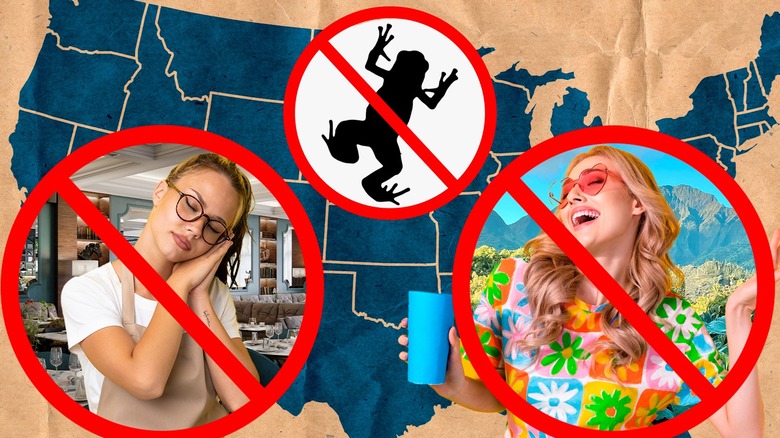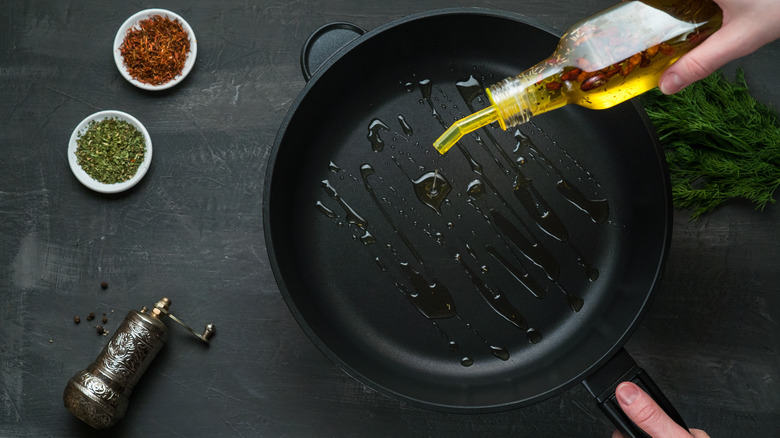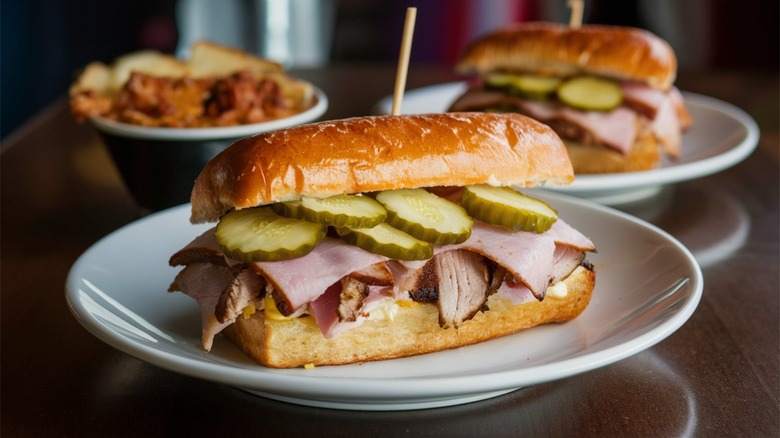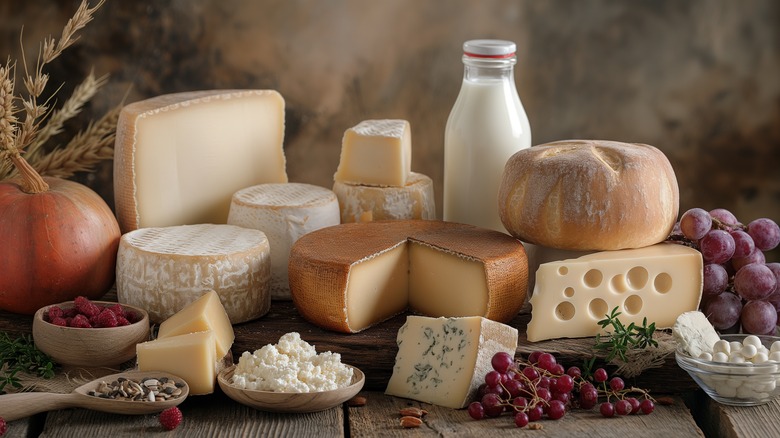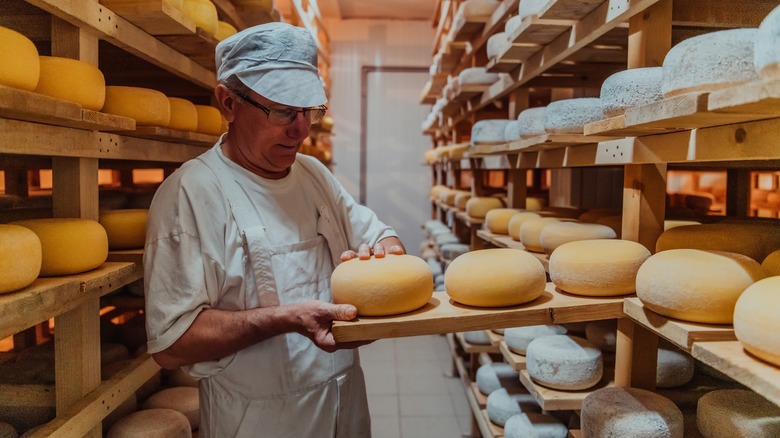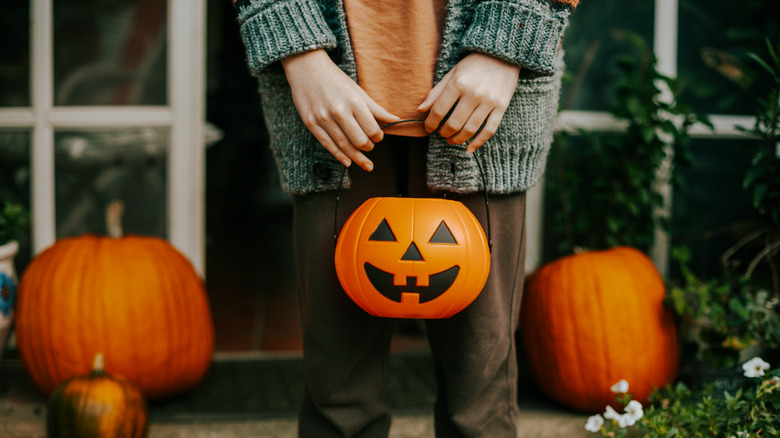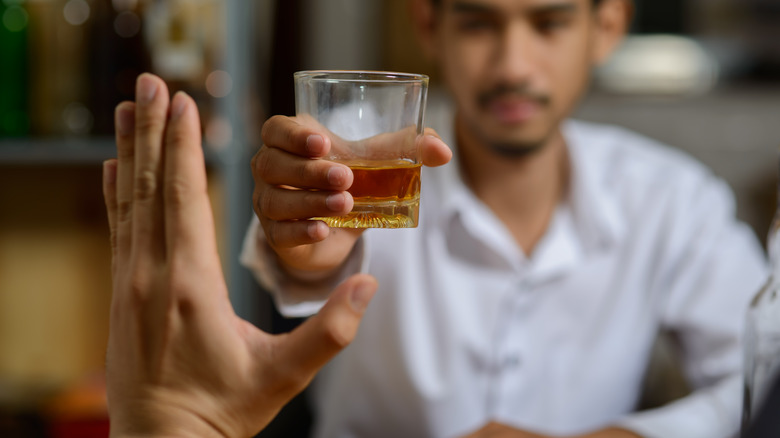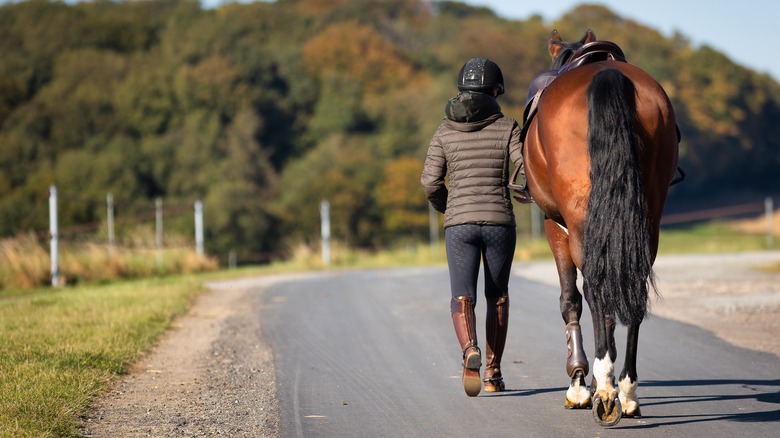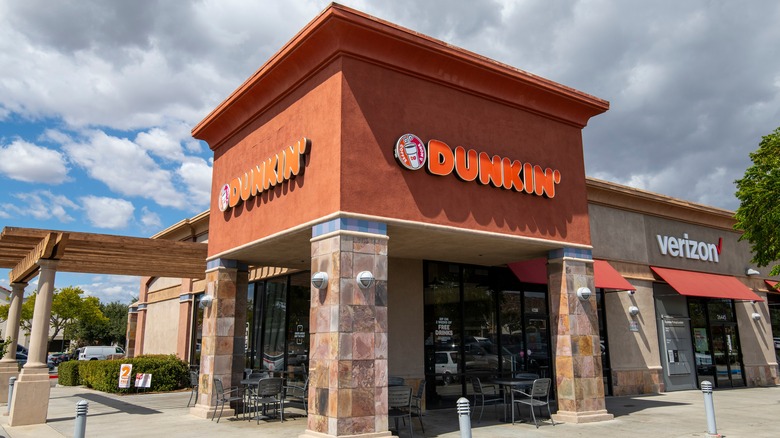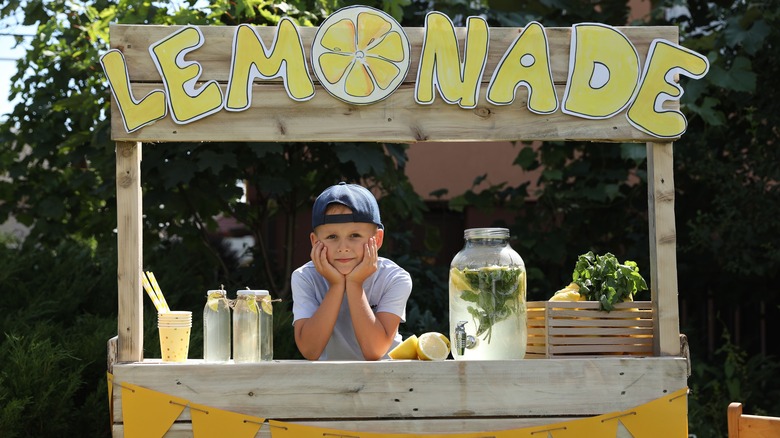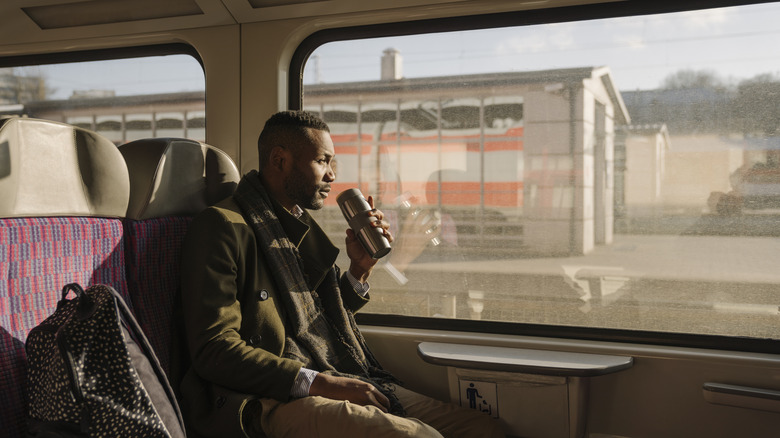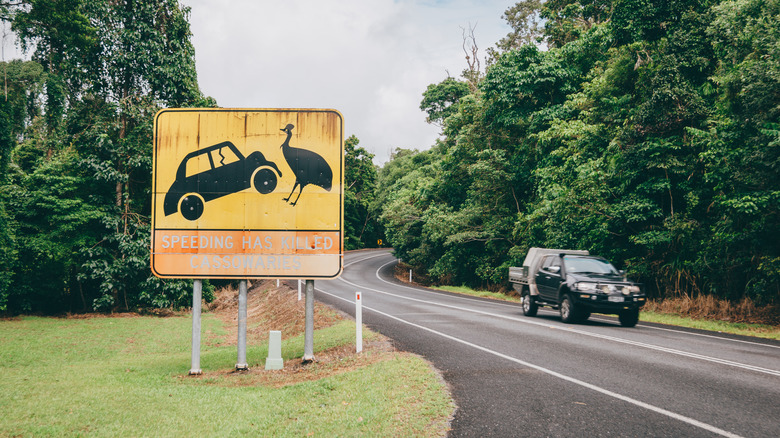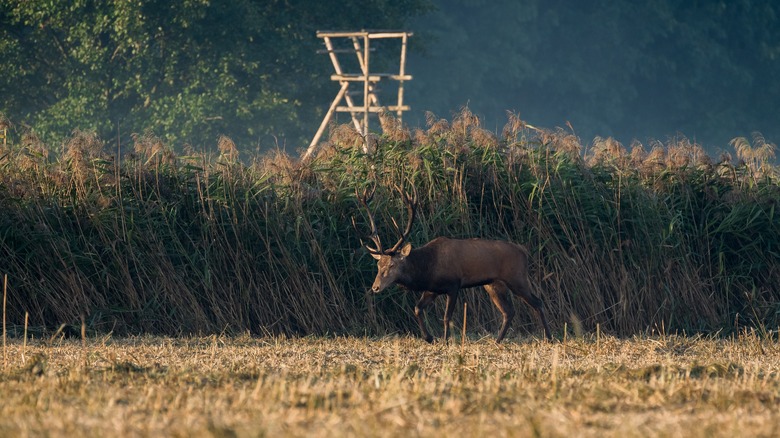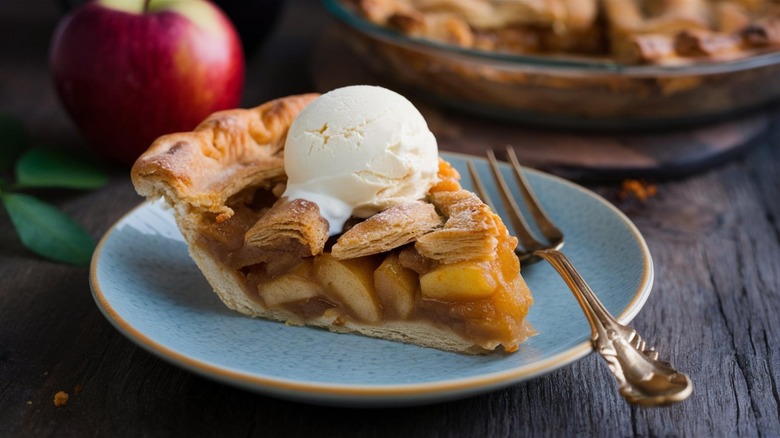19 Weird State Food Laws You Didn't Know Existed
We're taught that laws put in place by the government are approved for the common good of the public. There's a reason we're required to wear seatbelts in moving vehicles and why we aren't allowed to steal other people's belongings. Every now and then, however, a law comes out that leaves us scratching our heads. Of the many 50 states' quirky rules, most of the craziest ones are food-related.
From not being allowed to consume frogs to never sleeping in cheese factories, there are tons of wacky laws that have been put in place throughout the country. Some of these regulations have little to no backstory behind them. For others, it's easier to understand the intention behind their seemingly silly creation. Regardless of the purpose, though, there's no denying that several of these state food laws are intriguing, a bit outlandish, and dare we say, sometimes a bit weird.
1. North Carolina
Dine-and-dashers aren't the only thing restaurants have to worry about. Odd as it may sound, the theft of kitchen grease from establishments is quite common. It was estimated in 2019 that up to $75 million worth of this commodity is stolen every year in the U.S. These large amounts of cooking oil have a high monetary value since they can be used to make products like renewable diesel.
North Carolina had to create a law that prohibits contaminating or taking "any waste kitchen grease container or grease therein." The state declares stolen grease with a value of $1,000 or undercan lead to the perpetrator serving up to 120 days in jail and paying a fine. Should the grease be more than $1,000,the thief can be jailed for up to 39 months. Moral of the story? Whether you're reusing cooking oil from deep-frying a fish or popping popcorn in used bacon fat, make sure you're not using grease unlawfully taken from a restaurant.
2. Arkansas
Don't be too loud; the hoagies and subs are sleeping. That's what we imagine the lawmakers in Little Rock, Arkansas, were thinking when they made the oddly specific code. After 9 p.m., you can't beep your car's horn at a place where sandwiches and cold drinks are served.
Arkansas must be extremely punctual when it comes to letting its precious sandwiches get their beauty rest. How else would the bed of lettuce stay crisp and the tomatoes stay plump? Jokes aside, it's possible the rule was created to prevent employees and customers from being disrupted late at night when trying to work or enjoy their meal. While it's completely understandable to get excited over the blessing that is your Monte Cristo sandwich, don't go beeping your horn about it.
3. Wisconsin
Wisconsin didn't earn its title of The Cheese State for nothing. The midwest state makes a whopping 2 billion pounds of cheese each year, in turn producing 26% of the country's cheese. The fact that Wisconsin has laws in place concerning the production of the dairy product really shouldn't come as a surprise.
Dubbed as America's Dairyland, Wisconsin put forth several rules related to the grading and labeling of its cheese. For example, certified premium-grade AA cheddar must be "highly pleasing and free from undesirable flavors and odors." Even its color can't be dull or faded, and forget about it if the cheese has high edges or lopsidedness. Grade B cheddar, however, is held to less intimidating standards. It's only expected to have a "fairly pleasing cheese flavor" and can have "certain undesirable flavors to a limited degree." The specifics go on for different types of cheeses, from Colby and Monterey Jack to Muenster.
4. Tennessee
If you thought Wisconsin loved its cheese, wait until you hear about Tennessee. Though the state is widely known for foods like pulled pork and barbecue,the beloved dairy product has received its fair share of love from the law. Unlike Wisconsin, however, this rule has nothing to do with flavor.
Tennessee's code declares that people aren't allowed to sleep in places where food is sold or served. As if that didn't seem random enough, the code lists cheese factories as a specific example. Dining rooms, kitchens, and bake shops are also specified in the text, but none strike the same brow-raising chord as a cheese factory does. We can only wonder why Tennessee made such a rule. Was someone lulled by the hum of the machinery and the comforting scent of mozzarella? Or did the potent smell of blue cheese put a worker into a stink-induced sleep?
5. Illinois
Trick-or-treating has been an age-old Halloween tradition that goes back centuries. For over 100 years, the custom has been a community event that people of many ages can look forward to. Depending on where you're from, though, you might have just missed the cut-off for being able to participate in this festive night.
Under what the state calls "Halloween Solicitation," an Illinois ordinance states that it's unlawful for anyone above the eighth grade to join in on the spooky fun. There's also a curfew for when trick-or-treating can take place, and that would be between 5 p.m. and 8:30 p.m. If you're out of that time frame or just about to enter high school, stay off the streets on Halloween and instead celebrate the holiday by making your own sweet treats or buying them from a store. It's the perfect opportunity to try out a DIY peelable mango gummy recipe or to seek out those old-fashioned strawberry candies you've been missing.
6. Louisiana
Maybe a few too many prank pizzas were sent around in the state of Louisiana — at least enough that a law had to be created that makes executing these jokes pretty much impossible. In fact, all surprise deliveries are forbidden unless they're being given as an intentional gift. A paid-for basket of edible arrangements, for example, might have the pass.
Otherwise, there are a lot of nuances to sending items or services over to someone else's house. It's deemed unlawful to do so under numerous circumstances specified in the legal text, including, but not limited to: if the receiver didn't authorize the order; the receiver is required to pay for it; or if the sender does it with the intention of annoying them. There's not much wiggle room to pull a prank with all those caveats.
7. California
Frogs will jump for joy when they hear about the strange California law. Every year since 1930, The City of Angels Camp has held the Jumping Frog Jubilee of Calaveras County. This annual event entails a competition in which amphibians are placed on a lily pad and given three hops from this initial point. Afterward, the total distance between those leaps is measured. Rosie the Ribeter, who won in 1986, set an unmatched record of 25 feet and almost six inches.
If you already thought this was out of the ordinary, wait until you hear the rules that come along with the contest. One of the laws states that if a competing frog were to die, it must be destroyed immediately and can't be consumed. We aren't sure if anyone's first instinct after seeing a dead frog would be to eat it, espcially if it's the companion you spent years training for the competition. Nevertheless, California won't give anyone the option to even consider it.
8. Utah
Utah legislators seem to be concerned that drinking up a storm might further enrage the real one that brews around them. This half-joke is contingent on the state's rule that people are prohibited from selling, offering, or in any way providing alcoholic beverages to others during a state of emergency. A state of emergency can encompass a lot of serious situations, from natural disasters to epidemics.
While it might seem like a no-brainer not to hand out martinis as a fire rampages 30 feet away from you, Utah made the best choice by playing it safe. It's not uncommon for people to turn to booze to take the edge off, and that isn't the safest coping method to use during a state of emergency. If at any point you find yourself in the face of disaster, remind yourself of the law that stops you from clinking beer bottles with a neighbor.
9. New Jersey
I scream, you scream, we all scream for ice cream! Maybe that's just what the government of Newark, New Jersey, was afraid of when it finalized a law that regulates gatherings involving the beloved dairy treat. Whenever 20 or more customers have gathered on the premises of an ice cream-selling business, whether that be a nearby parking lot or plaza, a security guard has to be there from 4 p.m. and on until the establishment closes.
New Jersey has recognized that any group of people with ice cream in their hands is a real party. Newark's government is totally on board with that, so long as it's a protected party. After all, sugar rushes are a real thing, people. Who knows how bonkers ice cream lovers might get after finishing off a loaded cone of the sweet stuff? Or maybe the guards just want to make sure no one falls into an unsupervised sugar coma.
10. Florida
If you own a food truck and are currently cruising down the streets of Florida, you better cover up. The Sunshine State doesn't like when mobile food vendors are inappropriately dressed. This means anything that shows too much of someone's glutes or breasts. Because of that, Florida has deemed thong bikinis, T-back bathing suits, and G-strings unacceptable.
It's explained in the text that this rule was created with the intention of preventing traffic or hazards. It can be assumed that lawmakers feared the exposure of such body parts might leave fellow drivers distracted, in turn taking their focus off the road and possibly getting into an accident. Why this code doesn't explicitly exclude food vendors that are safely parked and off main highways, we aren't sure. Let's just say people selling ice cream bars and other cold treats have it lucky with something to cool them down, even with layers of clothing on.
11. Colorado
Animals can serve many purposes. While they're stunning creations to admire as they roam their natural habitat, they're also emotional support companions and pets. Sometimes, they're even...vehicles? Colorado seems to think so, per its laws.
The state has a law in place that orders pedestrians under the influence of alcohol to stay off of any parts of roadways typically used by moving vehicles. Following that, there is text that reads, "This section applying to pedestrians shall also be applicable to riders of animals." This means if you find yourself intoxicated and wandering onto a busy street while riding a horse or donkey, you're committing a class B traffic infraction and can be fined anywhere from $15 to $100. Better not to risk it and just save your horseback riding for when you're sipping water instead.
12. Maine
If you're in South Berwick, Maine, and ever have a hankering for one of Dunkin's iced coffees or donuts, skip the walk-in and opt for the drive-through instead. You could also park a few blocks down. Whatever you do, just don't park in front of the store, or else you'll be breaking the law.
While it sounds a little absurd that loyal customers are forbidden from parking at the shop they're purchasing from, it makes sense once you see the Dunkin' Donuts in question. This particular store, which is located on Main Street, is right near a busy intersection. The streets surrounding the establishment also aren't all that wide, so it would cause a bit of traffic and be too tight for other vehicles trying to squeeze past the cars parked in front of the Dunkin' Donuts.
13. Indiana
Driving down the street and seeing neighborhood lemonade stands is always a blissful sign you've reached the dog days of summer. A couple of dollars or sometimes even a few cents can get you a refreshing cup of the tangy juice. Even better is the joy it creates in the child selling it.
This isn't a common sight in Indiana, though, considering it's against the law for anyone under the age of 18 to operate these booths without a permit. Fortunately for the kiddos who want a chance to experience what it's like working with money and doing business, a bill was introduced in January 2024 to make it possible. The bill gets rid of a minor's need to have a license or permit to run such a stand. It has advanced through a series of actions and it's making its way toward potentially being passed.
14. Hawaii
What in the "Footloose" is going on in Maui, Hawaii? The Aloha State immediately conjures up imagery of hula dancers adorned in grass skirts and flower crowns. Naturally, one wouldn't suspect there'd be legal restrictions related to dancing there. However, Hawaii has a rule put in place that regulates the activity. It says dancing at clubs, bars, restaurants, and hotels cannot be done without a permit. If the establishment manages to get a designated dance floor approved, drinks can't be brought into the area.
This law is enforced apparently to keep the dance floor safe, as spilled drinks could cause people to slip. In 2015, a beach athletic club in Koloa was taxed a whopping $2,000 after people were caught dancing at an event — and this isn't an isolated incident. In response to such enforcement, the Maui Dance Advocates have spent years raising awareness about its disagreement with this law, promoting that people should be able to move how they'd like while listening to music in places that serve alcohol.
15. Michigan
Train rides are often for those who commute to work and travelers hoping to explore some neighboring city. Sometimes, however, it's also for concert-goers and party people who like to sneak a drink in to get their crazy night started a bit early. No matter the reason you're riding the train, it's not wildly surprising to find someone under the influence in one of the seats.
Michigan doesn't tolerate that on its public transportation, though. You'll either be refused entry or will simply be kicked off the train if you're caught in an intoxicated state (or drinking yourself into one). The conductor also has the power to seize the liquor from perpetrators, as well as bring them to a public officer and formally complain about the disruption caused. Those who violate this law can be fined up to $100 or serve at least 90 days in jail.
16. Virginia
This next law is a lot to digest — literally. In Virginia, if you were to accidentally kill any wildlife with your car, you could legally take it home. All you have to do is notify law enforcement immediately after it happens. If you weren't the one that hit the animal, you could still bring the remains to authorities after discovery and possibly be "awarded" with possession of the roadkill.
Residents took advantage, leading to an annual event called the Autumn Harvest Festival and Roadkill Cook-off. People gather to create different roadkill-based foods. Cooks of these dishes are required to use no less than 25% of an animal commonly found dead on the side of the road. The contests' rules list deer, rabbits, groundhogs, and snakes as examples of what can be used. Event attendees and judges then sample these unique dishes to determine a winner.
17. Arizona
In response to Virginia's surprising roadkill cook-off, Arizona's only request would probably be that you lick your plate clean. The state has some animal rules of its own, after all. More specifically, no edible portion of a game bird, game mammal, or game fish is legally permitted to go to waste.
That might sound a bit odd until you learn Arizona is one of the best states to be in if you're into hunting, making it clearer why they'd have such a rule. Forbes even ranked The Copper State fourth place among a list of popular hunting locations, making particular mention of Arizona's elk, bighorn sheep, and quail. Those who hunt such animals just have to be sure any edible part of the game is made use of.
18. Idaho
Why is it that Idaho is the only state in the country to make cannibalism illegal? A law has passed stating that "any person who willingly ingests the flesh or blood of a human being" can be imprisoned for up to 14 years, which is pretty lenient, if you ask us. Nevertheless, none of the other states have come forward to adopt any similar ordinances.
The only caveat to Idaho's law is that the person who performed cannibalistic actions might be excused if it was done under "extreme life-threatening conditions." Basically, that means cannibalism is understandable if you are stuck on a deserted island or in an apocalypse, and the only means of survival is eating someone else. Until that happens, Idaho sounds like the least intimidating place to be right now.
19. Vermont
Everyone has a special way of enjoying their sweet treats, from dipping fries in a milkshake to coating potato chips in chocolate. Vermont is no exception, especially when it comes to its state pie. One of the government's bills declares that when serving apple pie, people should put in effort to serve it with either a glass of cold milk, a slice of cheddar cheese, or a large scoop of vanilla ice cream.
Now this is a wacky law residents of Vermont can probably get on board with. Milk will do a terrific job of washing the sticky filling of apple pie down while also coating your tongue in dairy to get rid of any sickly sweetness. Pairing vanilla ice cream with pie is already commonly done to add extra flavor and moisture to what otherwise might be a dry dessert. And last but not least, putting cheese on apple pie adds a savory touch to the sweet stuff.
